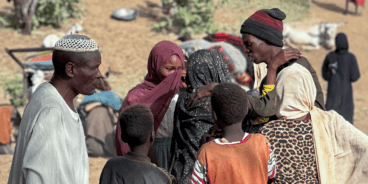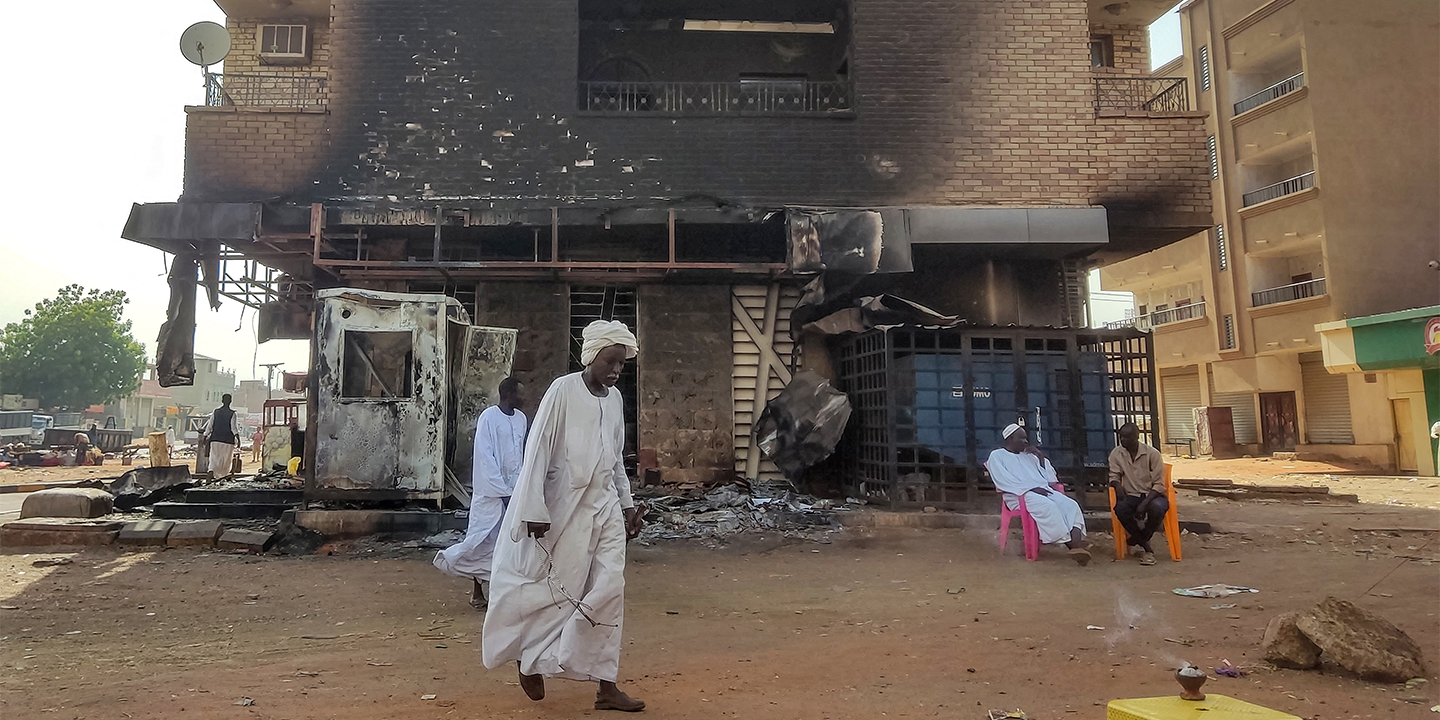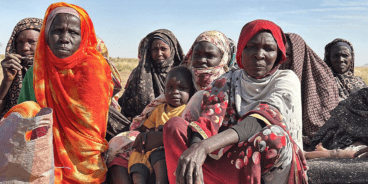

Atrocity Alert No. 360: Sudan, Myanmar (Burma) and Niger
Atrocity Alert is a weekly publication by the Global Centre for the Responsibility to Protect highlighting situations where populations are at risk of, or are enduring, mass atrocity crimes.
ATROCITIES ACROSS SUDAN CONTINUE UNABATED AS A HUMANITARIAN CRISIS UNFOLDS
Since Friday, 11 August, fighting between the Sudanese Armed Forces (SAF) and the Rapid Support Forces (RSF) has intensified in Nyala, the capital of South Darfur, resulting in at least 15 people killed and 20,000 displaced so far. Residents reported an exchange of artillery fire by the SAF and RSF, damaging residential areas, electricity infrastructure, water installations and communication networks. Clashes have taken place in Nyala since the outbreak of armed conflict in April, leading to hundreds of deaths and injuries. In recent days, the fighting has spread to Kubum area, 60 miles west from Nyala.
While the conflict between the SAF and RSF initially started in the capital, Khartoum, fighting has also accelerated in other parts of Sudan, most notably the Kordofan and Darfur regions, and an increased number of militia groups, often organized along ethnic lines, are now involved in the violence. The Armed Conflict Location & Event Data Project recorded a two-fold increase in fighting between the SPLM-N Al-Hilu faction and SAF in South Kordofan since June, resulting in at least 55 people killed between 15 July and 4 August. The current conflict in Sudan has also triggered an alarming escalation in ethnically motivated violence, especially in West Darfur, which may amount to war crimes, crimes against humanity and/or genocide. While the exact death toll is impossible to establish, the UN estimates that more than 4,000 people have been killed since 15 April.
In a briefing to the UN Security Council (UNSC) on 9 August, Martha Ama Akyaa Pobee, Assistant Secretary-General for Africa, stated, “The conflict in Sudan continues to have immense repercussions on the country and its people who continue to face unimaginable suffering. Humanitarian and protection needs are rising by the day with no signs of a reprieve.” More than 20 million people are facing acute food insecurity while the delivery of humanitarian assistance continues to be hampered by violence, looting and bureaucratic impediments. Edem Wosornu, Director of Operations and Advocacy of the UN Office for the Coordination of Humanitarian Affairs, told the UNSC that aid can often only be delivered after intensive negotiations with the warring parties, which are becoming “increasingly complex.” The denial of humanitarian assistance can constitute a war crime. The fighting in Sudan has also triggered a mass exodus, displacing more than 4.4 million people, including at least 1 million who have fled the country.
The international community must continue to urge warring parties to immediately stop the violence and sign an unconditional and indefinite ceasefire agreement. All parties must take steps to better protect civilians and their livelihoods, including by upholding international humanitarian and human rights law and allowing unimpeded humanitarian access. International donors must also pursue more innovative ways to deliver lifesaving aid and other essentials to the people of Sudan by supporting civilian-run “resistance committees” and neighborhood communities.
UN MECHANISM HIGHLIGHTS INCREASING WAR CRIMES IN MYANMAR
Last Tuesday, 8 August, the UN Independent Investigative Mechanism for Myanmar (IIMM) released a report analyzing evidence of potential international crimes collected in Myanmar (Burma) since July 2022. In this annual report, the IIMM highlighted that in the context of ongoing post-coup fighting in Myanmar, the military and its affiliates have perpetrated war crimes with increasing frequency and brazenness, including the indiscriminate or disproportionate targeting of civilians using bombs, killings of civilians or combatants detained during operations, and large-scale and intentional burning of residential homes and other civilian buildings. It also noted that the military has failed in its responsibility under international law to prevent or curtail war crimes committed by those under its command.
Over the past year the military has increasingly used airstrikes in its fight against anti-military resistance groups, often indiscriminately bombing civilian inhabited areas and causing grave civilian casualties. Although the military has claimed to be attacking military targets – even while bombing schools and monasteries – the IIMM has evidence that they either knew or should have known that large numbers of civilians were present. In one of the deadliest attacks since the start of the coup, during April the military bombed Pa Zi Gyi village, claiming to target an office and weapons storage facility for an armed anti-military group. The bombing killed at least 165 people, including women and children participating in a dance performance. Nicholas Koumjian, Head of the IIMM said, “Every loss of life in Myanmar is tragic, but the devastation caused to whole communities through aerial bombardments and village burnings is particularly shocking.”
The IIMM also found strong evidence of the commission of the war crimes of rape, murder, mutilation and cruel treatment, as well as the crimes against humanity of rape in detention, persecution, enforced disappearance, imprisonment and the carrying out of executions without having upheld fundamental fair trial rights and judicial guarantees. The report also notes the collection of substantial information relating to sexual and gender-based crimes committed against women, girls, men, boys and persons with diverse gender identities “with the highest levels of cruelty and harm to the victims,” including rape with objects, mutilation, gang or serial rape and sexual enslavement.
The IIMM Head asserted that, “we are building case files that can be used by courts to hold individual perpetrators responsible.” It is imperative that the international community use this evidence to hold perpetrators accountable, end impunity for Myanmar’s military and dissuade the junta from continuing its assault on the people of Myanmar. The military must also uphold its own duties under international law and investigate those within their ranks implicated in potential atrocities and remove them from service.
POTENTIAL RISKS FOR CIVILIANS FOLLOWING NIGER’S MILITARY COUP
On 26 July Niger’s presidential guard staged a coup and arrested President Mohamed Bazoum. In a message broadcast on national television, the self-proclaimed National Council for the Safeguard of the Homeland (CNSP) declared that they had overthrown Bazoum’s government, suspended all institutions, dissolved the constitution and closed the borders. On 10 August the coup leaders formed a 21-member government while the Economic Community of West African States (ECOWAS) convened a second extraordinary summit and decided to uphold regional sanctions and activate the ECOWAS standby force.
The People’s Coalition for the Sahel – an informal alliance of several dozen Sahelian and West African civil society organizations – released a statement on the situation, saying Niger has been “plunged into a state of uncertainty that leads civil society to fear the worst for the country and the region, particularly with regard to the well-being and protection of civilian populations.”
Since 2015 armed Islamist groups have targeted Nigerien security forces and civilians, with most of these attacks perpetrated in southeastern Niger by Nigeria-based Boko Haram insurgents and the so-called Islamic State West Africa Province. Starting in 2019 armed Islamist groups linked to Al-Qaeda and the Islamic State expanded from neighboring Mali into southwestern Niger and began targeting civilians, perpetrating violations that could constitute war crimes.
Despite the CNSP’s claims that they acted in response to a deteriorating security situation, attacks and civilian casualties have decreased in Niger since late 2021. President Bazoum’s administration aimed to remain reliant on the military, discouraging the creation of ethnic militias and self-defense groups – like those in Mali and Burkina Faso – and pursued inter-communal dialogue and disarmament, demobilization and reintegration to combat violent extremism. The government also sent emissaries to meet with Islamist militants and ethnic Fulani communities from which militants were recruiting.
Yet, the coup in Niger – the latest in a region with several recent military takeovers, including two coups in both Mali and Burkina Faso since 2020 – may further aggravate regional insecurity. While the two military-led governments promised to provide security, violence and atrocities have reached unprecedented levels in Burkina Faso and Mali. According to the Armed Conflict Location & Event Data Project, in 2022 deaths from violent incidents more than doubled in Mali while deaths increased 80 percent in Burkina Faso.
Christine Caldera, Central Sahel expert at the Global Centre for the Responsibility to Protect, said, “While the long-term impacts of the military takeover in Niger remain unclear, risks to civilians are heightened. The fallout of the coup may result in increased armed Islamist activity, the erosion of fundamental human rights and severe socio-economic repercussions.” The coup leaders must release all those who have been arbitrarily arrested and detained since 26 July. The civil and political rights of Nigerien civil society organizations and human rights defenders must be guaranteed and respected.
Related Content


Joint Statement: Genocide Returns to Darfur
